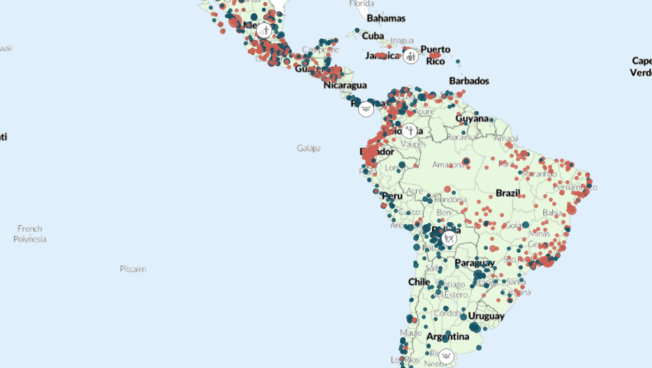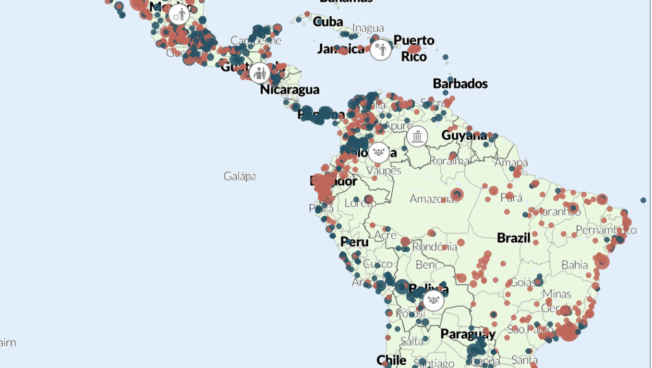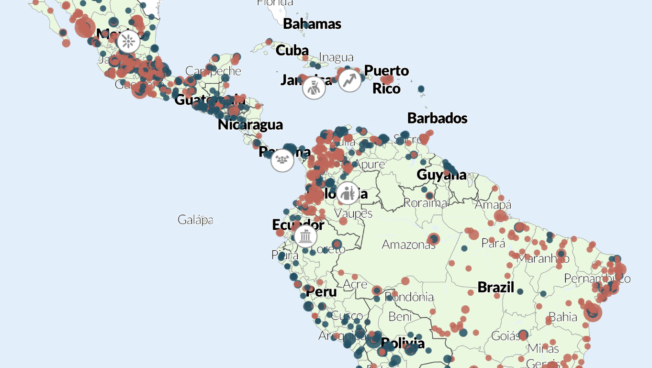Regional Overview
Latin America and the Caribbean
May 2025
Posted: 8 May 2025
In this Regional Overview covering April 2025
- Colombia: Violence escalates as the Gulf Clan launches a wave of attacks against security forces
- Ecuador: Re-election victory for Noboa amid rising violence and security challenges
- Haiti: Gangs’ offensive and the related security response drive an uptick of violence in the Centre department
- Jamaica: Police intensify anti-gang actions amid concerns over police abuses
- Mexico: Security forces’ operations prompt cartel retaliations in Michoacán and Baja California Sur
- Panama: Reform to the Social Security Fund sparks an increase in protests
Colombia: Violence escalates as the Gulf Clan launches a wave of attacks against security forces
On 5 April, security forces killed José Miguel Demoya Hernández, known as “Chirimoya,” a high-ranking member of the Gulf Clan, in a military operation in La Apartada, Córdoba.1Deutsche Welle, “Colombia announces death of top leader of the Gulf Clan,” 6 April 2025 (Spanish) In retaliation for the killing, the Gulf Clan launched a wave of targeted attacks against police and military stations and personnel, a tactic known as “Pistol Plan.”2Dagoberto Escorcia, “Drug trafficking carries out its ‘pistol plan’ in Colombia: 15 police officers and 12 soldiers killed in two weeks,”’ El Correo, 3 May 2025 (Spanish) In April, ACLED records 36 clashes between the Gulf Clan and security forces and 11 attacks against off-duty soldiers and police officers, leading to the death of at least 35 people and primarily affecting the Antioquia and Córdoba departments. The month thus became the deadliest for violence involving the Gulf Clan and state forces since ACLED’s coverage of Colombia began in 2018. It was even deadlier than July 2022, when the group launched a similar offensive for the extradition of its then-maximum leader, Dayro Antonio Úsuga David, known as “Otoniel.”
Colombian authorities doubled down on security operations against the Gulf Clan. As of 5 May, they claimed to have arrested 123 of its members, many tied to the “Pistol Plan.”3El Espectador, “Pistol Plan: over 120 members of the Gulf Clan have been captured,” 5 May 2025 (Spanish) The escalation of violence between the Gulf Clan and security forces may bury for good the already stalled negotiation process the government had announced with the group, marking another setback in President Gustavo Petro’s Total Peace plans.
Ecuador: Re-election victory for Noboa amid rising violence and security challenges
President Daniel Noboa won re-election in the 13 April runoff, securing around 56% of the votes. Noboa, who has been in power since November 2023, has focused his presidency on a crackdown against the rising threat of organized crime, through declaring an internal armed conflict and tasking the military to expand its role in public security. His left-wing opponent, Luisa González, has rejected the result and called for a recount, claiming fraud.4Ione Wells, “Ecuador’s President Daniel Noboa wins re-election,” BBC, 14 April 2025 European Union election observers, however, have found no evidence of widespread vote irregularities.5Alexandra Valencia, “EU observers ‘categorically’ reject Ecuador election fraud allegations,” Reuters, 15 April 2025
No major incidents occurred on election day, and, overall, the 2025 electoral process was not marked by high-impact events of political violence, unlike the 2023 snap elections. However, ACLED records over 140 events of violence targeting political figures between the start of the electoral process in February 2024 and the April runoff between Noboa and González. This is the highest number of events of any electoral process since 2018, with significant increases in Manabí and El Oro provinces. Worsening violence against political figures seems to mirror an overall deterioration of security in the country, with the first quarter of 2025 recording the highest number of homicides in the country’s recent history, according to authorities.6Alexander García, “The first quarter of 2025, the most violent in Ecuador’s recent history,” Primicias, 21 April 2025 (Spanish)
Tackling criminal violence, including that targeting political figures, will probably remain President Noboa’s main challenge. Although Noboa’s militarization strategy may have contributed to an initial reduction of violence in 2024,7Robert Muggah and Katherine Aguirre, “Ecuador’s tough on crime approach is popular, but major challenges remain,” The Conversation, 7 February 2025 it is unlikely to be sustainable over time, and he will now have to develop a comprehensive, long-term plan to tackle the country’s growing insecurity.8Steven Dudley, “Elected for a Full Term, Ecuador’s Noboa Needs a Plan,” InSight Crime, 14 April 2025
Haiti: Gangs’ offensive and the related security response drive an uptick of violence in the Centre department
Violence intensified in the Centre department after Viv Ansanm-affiliated gangs 400 Mawozo and Canaan launched an offensive on 31 March in Mirebalais and Saut-d’Eau, in an effort to consolidate control over the border with the Dominican Republic. Gangs attacked civilians and key infrastructure, including the prosecutor’s office, a local radio station, and two police stations, forcing around 6,000 people to flee the area.9Gazette Haiti, “Haiti/Insecurity: Nearly 6,000 forced displacements recorded in Mirebalais and Saut-d’Eau in two days, according to IOM,” 2 April 2025 (French) The move also highlights the ability of Port-au-Prince-based gangs to launch attacks beyond the capital, raising concerns that they could target key assets such as the hydroelectric Péligre Dam, which is located 15 kilometers away from Mirebalais and generates electricity for much of the country.10John Smith Justin, “Urgent Call to Protect Péligre Hydroelectric Plant,” Le Nouvelliste, 11 April 2025 The incursion triggered intense clashes with police and self-defense groups, leaving over 70 fatalities, mostly among gang members, in April. This marks the deadliest year on record in the Centre department since ACLED started recording violent events in Haiti in 2018.
Clashes between gangs and security forces also continued in the Port-au-Prince metropolitan area, where police and military forces, supported by self-defense groups, claimed to have killed at least 70 gang members in attacks on Viv Ansanm positions in Kenscoff, Port-au-Prince, and Gressier communes. Acknowledging the growing threat that gangs represent for Haiti’s stability, the United States announced the designation of the Viv Ansanm and the Gran Grif gangs as terrorist organizations on 2 May.11United States Department of State, “Terrorist Designations of Viv Ansanm and Gran Grif,” 2 May 2025 The designation seeks to hamstring financial and weapons supplies underpinning gang activities, and thus support the security response. However, the gangs’ control over the Haitian economy means that all financial transactions to Haiti could be at risk, compounding the country’s economic and humanitarian crises.12The Guardian, “US designates two powerful Haitian gangs as terrorist groups,” 2 May 2025
Jamaica: Police intensify anti-gang actions amid concerns over police abuses
Police forces clashed at least 15 times with armed groups in April, doubling the events of the previous month. Most occurred in the Greater Kingston area in Saint Andrew and Kingston parishes. These clashes led to the reported deaths of at least 18 people. Among those killed were at least three gang leaders, including Shacqol Pounal, leader of the 7’s gang, who was killed on 16 April. The day after Pounal was killed, another gang member was shot dead by security officers amid an alert issued by the Jamaica Constabulary Force regarding threats of retaliatory actions by the 7’s gang.13Jamaica Observer, “Elevated threat level for cops after fatal shooting of reputed gang member — JCF,” 16 April 2025
According to Minister of National Security Horace Chang, security forces have intensified their efforts to fight gangs in 2025 through operations and investigations that have impacted 63 criminal groups. This has contributed to reducing homicides in the first quarter of the year to the lowest levels in over two decades.14Vanessa James, “Jamaica on Course for Another Monthly Low Murder Rate in April,”Jamaica Information Service, 1 May 2025 In the first four months of 2025, ACLED records a 48% decrease in violence targeting civilians at the hands of armed groups in Jamaica, compared to the same period in 2024. At the same time, the number of clashes involving security forces and their deadliness are the highest since 2018. This is prompting public backlash: On 29 April, the social movement Jamaicans for Justice marched in Kingston to denounce the rise in police abuses and demand greater accountability.15Sheri-kae McLeod, “Jamaicans for Justice to lead protest against rise in police killings,” Caribbean National Weekly, 10 April 2025
Mexico: Security forces’ operations prompt cartel retaliations in Michoacán and Baja California Sur
On 23 April, suspected members of the Jalisco New Generation Cartel (CJNG) clashed with military forces in four municipalities of Michoacán state. They also set vehicles on fire to block roads in 24 municipalities in Michoacán and in four other municipalities in Jalisco and Guanajuato. CJNG-led violence in April echoes a similar show of force in March in response to security operations that are suspected to be aimed at arresting a high-ranking member of the organization.16Alejandro Santos Cid, “Four hours under fire from the Jalisco Cartel in 30 municipalities across three states: ‘We’re going to have a party,’” El País, 28 April 2025 (Spanish) However, Secretary of Security Omar García Harfuch claimed that the escalation of violence is driven by disputes between criminal groups.17Alejandro Santos Cid, “Four hours under fire from the Jalisco Cartel in 30 municipalities across three states: ‘We’re going to have a party,’” El País, 28 April 2025 (Spanish) The security operation that seemed to prompt CJNG’s violent retaliation was part of intensified state operations and clashes with organized crime groups in Michoacán that resulted in the deaths of at least 30 armed men and security forces’ personnel in April, making it one of the deadliest months for clashes between state forces and non-state armed groups since 2018.
The CJNG was not the only organized crime group to step up retaliations against security forces in April. In Baja California Sur, security forces defused an attempt by the Sinaloa Cartel’s Los Mayos faction to make inroads in the state, which is currently under the Los Chapitos faction’s influence.18El Mundo Digital, “The Mayos against the Chapitos: The looming war in BCS; security forces quell the first attempt”, 26 April 2025 (Spanish) This sparked a series of criminal group-led retaliatory attacks against security forces. Notably, on 22 April, in two separate attacks, suspected members of Los Mayos killed an officer of the State Agency of Investigations in La Paz and a military officer in Mulegé, while both of them were off duty.19Zeta, “Mayos involved in attack on Commander Cota,” 29 April 2025 (Spanish) Following the attacks, security forces arrested seven Los Mayos members.
Panama: Reform to the Social Security Fund sparks an increase in protests
On 18 March, President José Raúl Molino ratified a reform to the Social Security Fund that was approved days before by the parliament. It incrementally increases the employer’s contributions in the coming years and mandates that independent workers make contributions to the fund, among other provisions.20Swiss Info, “Panamanian Parliament approves social security reform to combat its deficit,” 14 March 2025 (Spanish) The reform sparked significant opposition, particularly from labor unions and education professionals, who argue it reduces employees’ pensions, eliminates solidarity mechanisms, and opens the door to the privatization of the system.21Swiss Info, “Panama suspends classes on Monday due to protests announced by union groups,” 28 April 2025 (Spanish) Protests occurred throughout the legislative debate and following the reform’s approval in March, but significantly increased in April. ACLED records 70 demonstrations in April, two-thirds more than in March, making it one of the highest monthly levels since ACLED started covering the country in 2018.
Adding to the tensions, the government also signed a security agreement with the United States on 10 April, allowing the presence of US troops in the territory.22Santiago Vanegas, “Panama returns to the colonialism of the ‘fifth frontier’ with the new agreement signed with the U.S. regarding the Canal,” BBC, 24 April 2025 (Spanish) The vast majority of the protests recorded in April were against the reform and this agreement, which protesters claim violates the country’s sovereignty. The protests took place in 10 of the country’s 15 provinces and Indigenous districts. Although most demonstrations were peaceful, many turned violent toward the end of April, as police started intervening with tear gas and by arresting demonstrators.23Crítica, “Arrests, clashes, and shouts of ‘Down with Law 462,’” 6 May 2025 (Spanish) As tensions mount with the government seemingly unwilling to concede, Panama could experience another wave of protests.
See More
See the Codebook and the User Guide for an overview of ACLED’s core methodology. For additional documentation, check the Knowledge Base. Region-specific methodology briefs can be accessed below.
Links:







